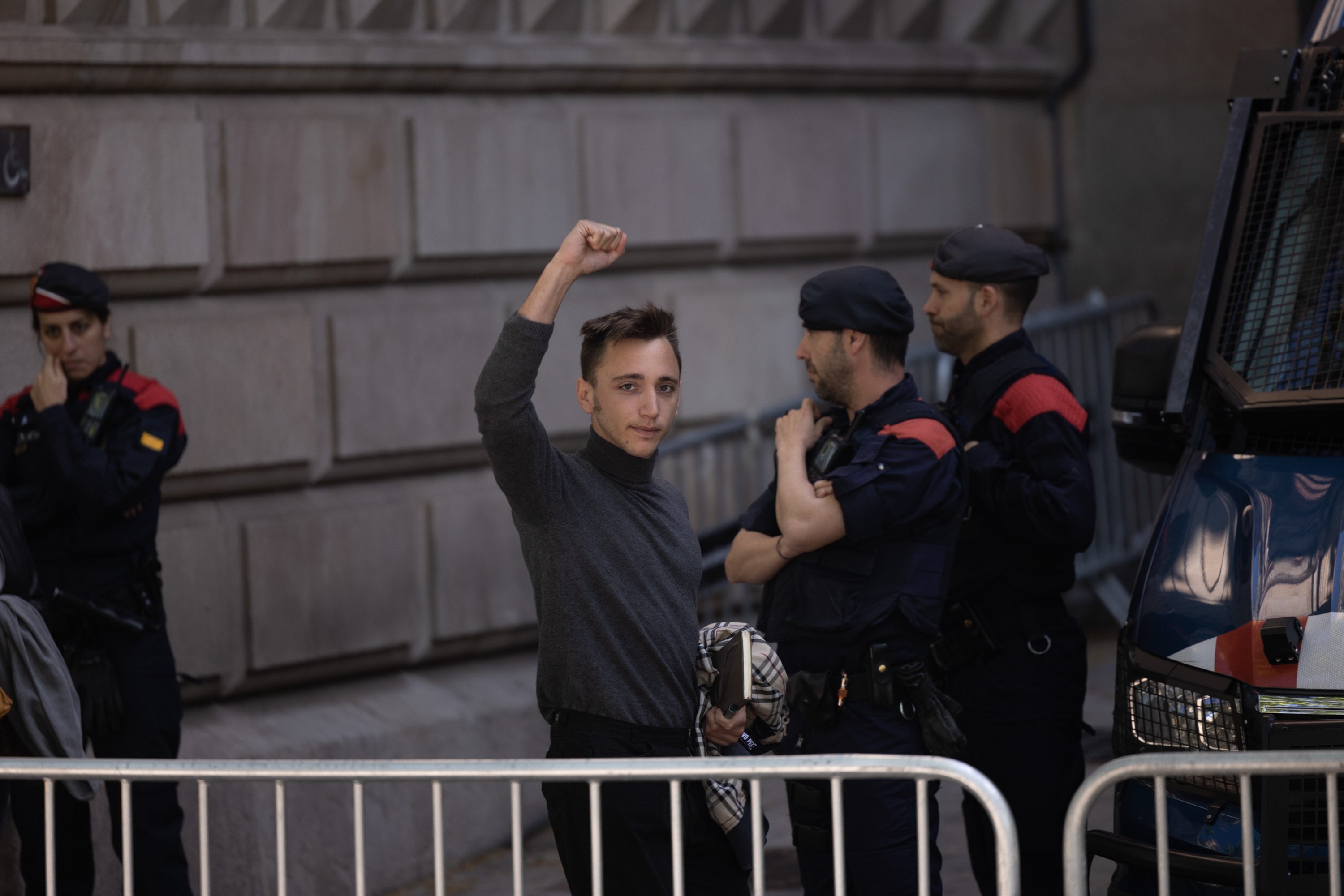A significantly reduced sentence in a case that resounded with controversy. The appeals chamber of the High Court of Catalonia (TSJC) has partially accepted the appeal lodged by Badalona activist Marcel Vivet and reduced his initial sentence of five years jail to one and a half years, which means he does not have to go to prison, since the new sentence is below the two year threshold. The Barcelona Audience convicted him for slightly injuring a Mossos d'Esquadra agent on September 29th, 2018 in the so-called 'Holi' counterprotest against a demonstration by the right-wing police union Jusapol. For this, Vivet was sentenced to two years' jail for public disorder and three further years for assaulting a police officer, as well as a fine of 600 euros for a minor injury to the officer, to whom he also had to pay 1,511 euros in compensation.
Today, it has been announced that the TSJC has reduced the sentence to one year for public disorder and six months for assault on the officer, with the fine falling to 180 euros, although the 1,511 euros' compensation to the officer is maintained. The reduction is justified by the court on the grounds that it does not consider the flagpole with which he hit the officer's wrist to be a dangerous object, a classification which aggravated the sentence. In fact, the pole broke due to its fragility, according to the court, which states that as its nature was unknown, an aggravating factor cannot be applied.
Different aggressions
Apart from the severity of the sentence, the case was mired in controversy due to other aspects. In late April, the appeals chamber of the TSJC held a hearing to discuss whether it would take into account a key piece of evidence for Vivet's defence. His lawyer, Carlos Hurtado, provided a police statement, in which the Mossos officer that accused Vivet of the assault, is also accusing another young man, Adrià Catasús, in a case in which the prosecution demands six years' imprisonment for the same charges - disorderly conduct and slightly injuring him - in the same Holi protest in 2018. The Catalan interior ministry insisted that they were two different actions, and the court also states this and rules out annulling Vivet's proceedings. "We are facing different aggressions, caused by different people, and therefore it is not possible to say that these are the same facts, as the appellant claims," said the reporting judge Carlos Mir. However, the court has admitted that in the indictment against the other man, accused of hitting the Mossos officer in the shoulder without causing injury, the prosecution had incorrectly written that the assault was carried out with a "flagpole", which was a "mistake".
At that hearing, Hurtado insisted that the conviction was based on "a single piece of evidence": the testimony of the Mossos police officer, who is also the one who made the accusation. In addition, the defence alleged that the slightly-injured Mossos did not clearly identify Vivet, and that images and videos of the scene only show the pro-independence activist with a flagpole, but with a peaceful attitude. In the appeal ruling, the court admits that "there is no image" in which Vivet is seen beating the officer, but that it gives full credibility to the Mosso's declaration and to the evidence provided over the minor injury: swelling of the wrist. Therefore, he convicts the activist to a crime of assault on the officer, in addition to that of disorder.
Nevertheless, the reduction in the sentence was celebrated by Vivet's colleagues.
LLUITAR SERVEIX, NO RENDIR-SE SERVEIX, PLANTAR CARA SERVEIX. NI UN PAS ENRERE.
— Marcel Absolució (@marcelabsolucio) May 5, 2022
GUANYAREM✊🔥 pic.twitter.com/OCJga3iW5F
Tweet translation:
"It's worth it to fight, it's worth it not giving up, it's worth it to take a stand. Not one step backward. We will win"- Marcel Absolución (support group).
Catalan ministry's involvement
In fact, just yesterday Catalan interior minister Joan Ignasi Elena explained in parliamentary committee, and with the presence of Vivet among the public, that when he entered the ministry he saw the need to change the criteria under which the Catalan government pursued its own prosecutions in protests, and it was decided to file an appeal against the sentence, which was proven to be justified by the avoidance of the "injustice" of the original sentence against Marcel Vivet.
The secretary general of the interior ministry, Oriol Amorós, made no secret of blaming the Catalan government's demand in the case for six years' jail for Vivet on the previous administration, under president Quim Torra, which was in power when the incidents took place and when the legal services of the interior ministry made the request to pursue the case. The lawyer for the Catalan government, however, did not ask for Vivet's acquittal in the appeal, but for a reduction in the sentence to six months in prison. The officer, seeing the change in the Generalitat's approach, was represented by a private lawyer, José Antonio Bitos, who asked for the original sentence to be maintained, and the Catalan government was thus expelled from the proceedings.

